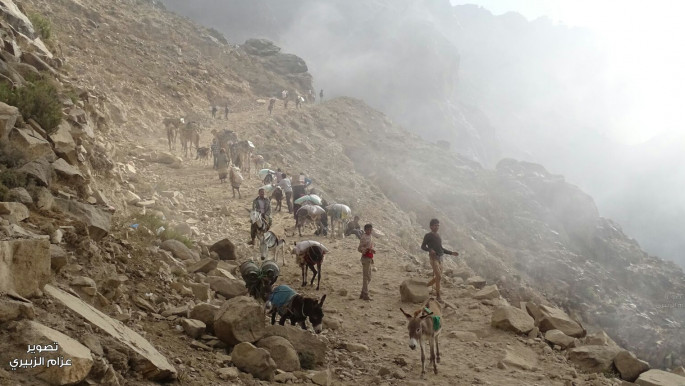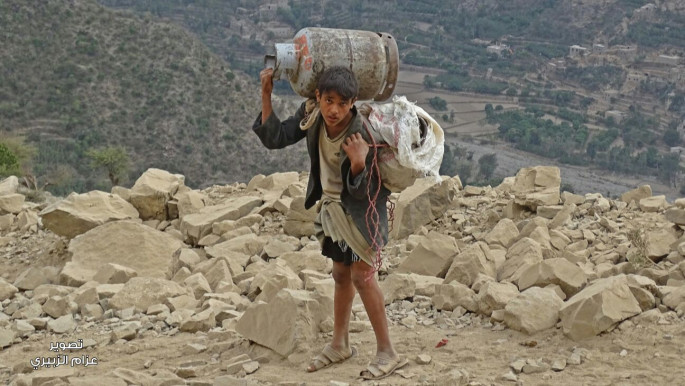The tragic tale of Taiz under siege
After repeated delays to our calls, I was finally able to get hold of Azzam Al-Zubairy, a first year student studying journalism. Azzam lives in the city of Taiz, central Yemen. Like another 200,000 in this city, Azzam is living under siege.
The University of Taiz, Azzam's university, was closed in March 2015 after violence - between the Houthi and Saleh forces on one side and the local resistance on the other - reached the city.
Yemenis have been living through a dire humanitarian situation, but the people of Taiz have a more complex story.
Azzam's father is an estate agent, but he lost his job at the beginning of the conflict.
Azzam, meanwhile, turned to photography to tell the story of his besieged city. In August, after the Houthi and Saleh forces were pushed out of Taiz, the entire city fell under their siege. Houthi and Saleh forces prevented food, water and even medicine from entering, forcing thousands of families to flee the city.
Azzam and his family, however, decided to stay.
"Many families can't afford to leave their homes," Azzam said. "Residing in a new place requires money."
Hospitals were forced to close down. Now, the city has just three hospitals serving more than 200,000 people. Those hospitals rely solely on smuggled medicine that can only come in limited quantity and is vastly overpriced.
A lack of oxygen cannisters is leading to a high infant mortality rate. To reach the hospital, bootleggers smuggle the cannisters on the back of camels, through the mountains, far from the reach of the Houthi artillery.
 |
|
| Taiz denizens have relied on a treacherous smuggling route route through the mountains [Azzam Al-Zubairy/Taiz] |
"There are more than 30 checkpoints surrounding Taiz," Azzam says. "And the only functioning market is outside the city, controlled by the Houthis."
Houthis open the Duhi passageway to the market, from one hour to three hours per day, and thousands queue to bring their food daily. Sometimes Duhi is closed, sometimes people are humiliated, forced to leave their food behind.
Azzam helped me to get in touch with some families who told me they live on one meal a day and have to pass through the Duhi passageway, despite the ritual and daily humiliation they go through.
In December, Houthi militants at Duhi started to arrest young men passing through, accusing them of being members of the resistance or helping the resistance. Women and children started to queue instead, standing in line all day to be allowed through for an hour or two, all just to buy food for their families.
 |
|
| Young men are particularly targeted by Houthi militants on the road to the market [Azzam Al-Zubairy/Taiz] |
"A kilo of potatoes inside the city costs 500 Yemeni Rial, while in the market it only costs 200 Rial," said Azzam.
But even vital aid is being prevented from entering the city, agree the UN, MSF and ICRC. All negotiation attempts to convince the Houthis to allow aid into Taiz have failed.
A long journey
On February 20, Azzam decided to make the journey through the mountains. He had a friend who wanted to leave for Aden and Azzam joined him.
He left the city at 8am and arrived in the mountaintop Mashraa Wa Hadnan village at 10:30am. From there, he had to walk onwards to Talooq village, another hour-and-a-half journey.
There you see camels and donkeys carrying oxygen cylinders, medicine boxes and a few fruits and vegetables, just arrived from the bottom of the valley after two hours of climbing the mountain. Many people hire out their donkeys and camels to carry people's goods for 3,000 Rial ($14) per ride.
Some women and children carry others' loads on their back, and will charge 500 Rial ($2.30) and will climb the whole mountain. They use their back as a source of living.
After descending the far side of the mountain, Azzam and his friend drove for six hours on a bumpy road and finally arrived at Al-Turbah village, home to more than 4,000 families displaced from Taiz.
Al-Turbah is safer and has better access to food supplies. The village is under the resistance's control and is far from the reach of Houthi and Saleh forces.
Azzam was left here by his friend, who still had a seven-hour drive to reach the southern city of Aden.
Seeing the women and children climbing the mountains to secure a basic livelihood, Azzam describes his feelings as he was climbing those mountains, that he felt abandoned.
"The people of Taiz were abandoned by everyone, we were abandoned by our own government, abandoned by the human rights and humanitarian organisations, abandoned by the world."
Baraa Shiban is a Yemeni human rights activist and Yemen's project coordinator for Reprieve. Follow him on Twitter: @BShtwtr
Opinions stated in this article remain those of the author and do not mecessarily reflect those of The New Arab, its editorial board or staff.





 Follow the Middle East's top stories in English at The New Arab on Google News
Follow the Middle East's top stories in English at The New Arab on Google News


